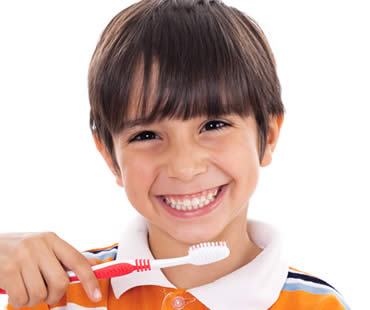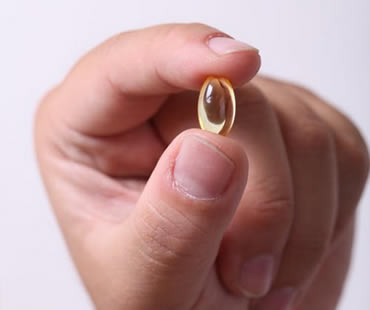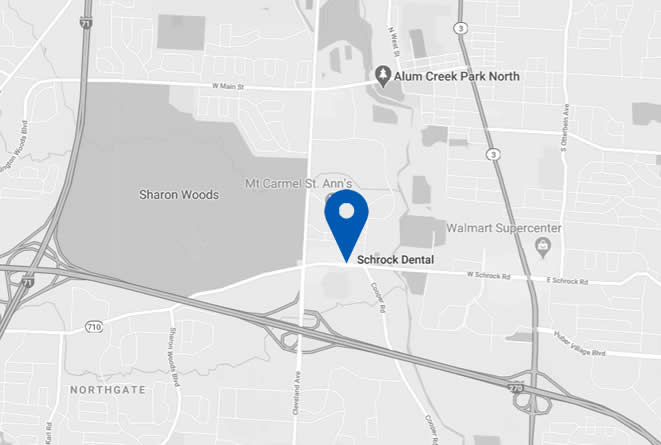
Babies obviously can’t take care of themselves, so parents have to handle all aspects of their care. Don’t forget their oral health! Parents need to lay the groundwork for lifelong good dental habits and healthy smiles for their children. Here are some answers to common questions about baby teeth.
Do baby teeth matter?
Primary, or baby, teeth are important. They help children chew naturally and speak clearly. They provide the place for adult teeth to grown in properly later.
Should I brush my baby’s teeth?
You should brush your baby’s teeth without toothpaste, using a small amount of water instead. Use a small, soft-bristled toothbrush at bedtime to remove plaque and bacteria from your baby’s teeth and gums.
When can I start using toothpaste?
Fluoride toothpaste can be implemented after age two, when a child can be trusted not to swallow the toothpaste. Only use a small amount of toothpaste, and watch the child carefully to ensure proper brushing and spitting out the toothpaste.
When should I take my child to the dentist?
Experts recommend taking your child to the dentist when their first tooth appears, or by their first birthday. Your child should be taken for dental visits every six months, or more often if your dentist has concerns.
Do I need a certain type of dentist for my child?
You may choose a pediatric dentist who has been trained specifically to treat children. Their goal is to teach children about oral hygiene and the importance of taking care of their teeth, as well as provide a comfortable experience in visiting the dentist. However, you may also choose a regular dentist to take care of your child’s oral health. It is up to you to decide which kind of dentist is right for your family.
Schedule your appointment at our Westerville dental office

Severely damaged, injured or diseased teeth can lead to not only cosmetic problems with your smile, but also functional ones. Your dentist may recommend dental crowns or dental bridges to treat your dental issues.
Dental crowns are a restorative dental therapy that covers the affected tooth completely, serving as the new outer surface of the tooth. A dental crown maintains the natural roots of a tooth and can prevent extraction. A dental bridge fills the gap left by one or more missing teeth and is affixed to bordering teeth with an anchoring crown.
Both dental crowns and dental bridges are made from a variety of materials that can be designed to match the color of your surrounding natural teeth. As opposed to removable prosthodontics such as full or partial dentures, dental crowns and bridges are permanently bonded to existing teeth or dental implants, allowing them to function and appear as natural teeth.
Dental crowns and bridges have a number of advantages and benefits, such as:
- Dental crowns protect the natural tooth after a root canal therapy, helping to prevent bacteria re-infecting the tooth that could lead to extraction.
- Dental bridges restore gapped or missing teeth, providing support to the surrounding teeth, preventing them from shifting in to fill the empty space and affecting your speech, bite and smile.
- Your dentist can typically place dental crowns and bridges in as few as two appointments.
- Dental crowns and bridges are both long-lasting, durable therapies, designed to protect your natural tooth for years to come.
- Dental crowns prevent bone loss by preserving the natural tooth roots, thereby stimulating the jawbone, preventing resorption, or shrinkage, of the bone following extraction.
If you have questions about what a dental crown or bridge can do to improve the form and function of your smile, talk to your dental professional today. You can restore your healthy smile and preserve it for years to come with a dental crown or dental bridge treatment.
If you need a dentist in Westerville contact us today

A wisdom tooth is often extracted to correct an existing dental problem or to prevent the possibility of problems that may arise in the future. Some problems associated with wisdom teeth are:
- Your jaw may be too small to accommodate the eruption of your wisdom teeth, leading them to become impacted (stuck in the jaw, often under the edge of an adjacent tooth) and unable to erupt through your gums.
- Your wisdom teeth may partially erupt, leaving a flap of soft gum tissue to grow over the tooth. Food, bacteria and germs can get trapped underneath this gum flap, leading to swelling, redness and pain, which are signs of infection.
- Impacted teeth can lead to a more serious problem, such as acute infection, damage to the surrounding teeth, damage to the bone or the development of a cyst.
- Wisdom teeth can present at an awkward angle, coming in with the top of the tooth facing sideways, forward or backward.
Removing your wisdom teeth can be a good method to prevent:
- crowding at the back of the mouth
- an impacted wisdom tooth stuck in the jaw and never erupting
- painful gums or infection caused by a flap of gum skin
- gum disease or tooth decay in the individual wisdom tooth or in the surrounding teeth and gums
You may want to have your wisdom teeth removed when you are younger because:
- The younger you are, the less developed your wisdom teeth roots are, and the less dense your jawbone, allowing for an easier extraction of the tooth.
- The majority of problems with wisdom teeth begin between the ages of fifteen and twenty-five.
- If you have a medical condition that is known to worsen with time, you may choose to have your wisdom teeth out early, while you are in your best health, to facilitate maximum healing.
Wisdom teeth extraction is rarely harmful, but there are risks associated with any surgery. Talk to your dentist today about any concerns you have regarding wisdom tooth extraction.
We look forward to seeing you in our Westerville dental office

Kids will be kids, and emergencies happen that can affect the mouth. To avoid long-term damage, extensive pain, or unsightly results, it’s important to know what to do in a dental emergency. Let’s learn what you should do when your child has one of the following common oral problems.
Severe toothache:
Look for food stuck between the teeth, and if so try to dislodge it with floss. Clean the affected tooth and rinse the mouth well with warm water. Swollen gums may indicate an infection, which requires a dental visit. Facial swelling can be relieved with cold compresses, but if it accompanies severe pain you should take your child to the dentist or emergency room. Try giving over-the-counter pain reliever, but don’t place the medication directly on the gum or tooth.
Chipped tooth:
If your child chips a tooth, contact your dentist immediately. Fast action can help save the tooth, reduce the risk of infection, and prevent extensive procedures. Have your child rinse with cold water. If you can find the tooth fragment, take it to the dentist in case it can be bonded back in place.
Knocked out tooth:
The first thing to do is locate the missing tooth. Hold it by the crown instead of the root, and rinse it gently. Try replacing the tooth back in the socket, and have your child bite a piece of gauze or cloth to hold it in place until you get to the dentist. If you can’t insert it, place it in a cup of cold milk to take with you. Time is important in saving a displaced tooth, so see your child’s dentist immediately.
Cut lip, tongue, or cheek:
Ensure your child’s teeth are undamaged, and apply firm pressure with a moist washcloth or teabag to the bleeding area. If it doesn’t stop in fifteen minutes, call your child’s dentist or head to the emergency room. If the tongue is bleeding, there’s not much you can do except wait to see if it stops bleeding on its own within fifteen minutes. If not, visit the dentist or emergency room.
We treat patients from Westerville and the surrounding area

Experts recommend that each member of your family see a dentist every six months for ideal oral health. One of the most convenient ways to accomplish this is to establish a relationship with a qualified family dentist. This type of dentist sees patients of all ages and oral conditions, so that you can all get the dental care you need in one place.
Dental checkups are usually considered to be rather routine. During the visit, you generally will have your entire mouth examined, X-rays taken if recommended, and professional teeth cleaning performed. Evaluations will be made for signs of tooth decay, gum disease, oral cancer, or any other issues that might be of concern. You can expect all of these typical treatments from your family dentist.
Another important part of your dental visit is to discuss your oral condition as well as your overall health with the dentist. If you are the parent of a young child, you will need to voice any issues with the dentist that your child may have. Some of the topics to discuss with your dentist include changes you’ve noticed in your oral condition, pain or other problems you are experiencing, medications that you are taking, and any other health problems that are present. Your oral health and your general health can be linked in many ways, so it’s important to be open and thorough in your discussions with your family dentist.
Family dentists are experienced in handling all kinds of patients and their concerns. Dental anxiety or phobia is one example, since it’s not uncommon for patients to be nervous about the dentist. Young children are especially susceptible to this concern, but family dentists are well-versed in treating them. Senior patients bring their own unique set of issues, and family dentists are able to successfully treat this age group as well. Family dentists are also able to make recommendations for other types of specialists as needed, such as orthodontists, endodontists, or oral surgeons. The goal is good oral health care for every member of your family, and that is what family dentists are trained and experienced in providing.
We look forward to seeing you in our Westerville dental office

As we age, our teeth and gums change. Proper care of your teeth as well as eating a good diet can keep your smile beautiful and strong. Certain vitamins and minerals also help promote optimal oral health.
As we age, our teeth and gums change. Proper care of your teeth as well as eating a good diet can keep your smile beautiful and strong. Certain vitamins and minerals also help promote optimal oral health.
Vitamin A
Besides aiding with vision, Vitamin A also helps with the development of healthy teeth and gums. As well, Vitamin A contains beta-carotene, which has antioxidant properties. These antioxidants assist in getting rid of free radicals, chemicals that speed up decay in the body.
Vitamin C
Also called ascorbic acid, Vitamin C assists with the absorption of iron, maintains healthy connective tissues, and promotes strong teeth and gum tissue. Because Vitamin C is water-soluble, it is washed out of the body once it has what it needs, people should take in Vitamin C every day.
Vitamin D
Created after exposure to sunlight, Vitamin D encourages calcium absorption as well as helping keep the right levels of calcium and phosphorous in the blood stream. Children need to get enough Vitamin D so that they will develop healthy teeth and bones, so it is often added to milk.
Calcium
No matter your age, every person needs to take in enough calcium because this mineral is crucial in the development and maintenance of teeth and bones. In fact, your jaw bone forms the foundation that houses your teeth.
Getting What You Need
Eating a balanced diet will ensure that your body has the vitamins and minerals needed to keep your smile vibrant for a lifetime. Dairy products like yogurt and cheese as well as vegetables such as broccoli and peas are high in calcium. Have lots of egg yolks, fatty fish, and fortified dairy products when you need Vitamin D. Citrus fruits, melons, berries, and tomatoes offer plenty of Vitamin C, and you can find Vitamin A in dark green or yellow fruits and vegetables, eggs, or low-fat dairy products.











